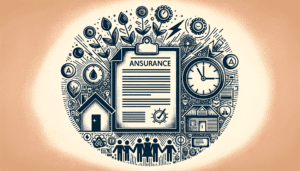5 times long-term disability insurance makes sense

Have you ever wondered if you need long-term disability income insurance? If you have a traditional 9-5 employer, they may offer a group long-term disability income plan, provided at a group rate. That’s what’s normally referred to as long-term disability, or LTD insurance. However, if you’re self-employed, a business owner, or simply don’t have enough (or any) coverage through your employer, you may be curious as to whether or not purchasing individual disability income insurance is in your best financial interest.
Long-term disability insurance and individual disability income insurance can help financially protect you if you were to become unable to work due to an illness or injury that keeps you out of work for over 90 days (this is the typical elimination period but policies differ and you would need to verify the exact terms on any policy that covers you or that you consider purchasing). Most policies offer to cover a percent of your pre-disability income for a set period of time with a general maximum of 66.66% of your income as a monthly insurance payout in the event that you become disabled.
But how do you know when disability insurance makes sense for your lifestyle?
1: You’re a working parent
If you’re a parent, your child relies on your income. Although you may feel comfortable risking the sustainability of your own lifestyle needs without long-term disability insurance, it’s a lot harder when you have dependents in the picture. When you’re a parent, having partial income replacement when you experience a disabling injury or illness can make a world of difference for your family. When you have young kids at home, you likely have more expenses than you would if you were young and single, or if you were closer to retirement.
You can find coverage to help you to cover:
Your rent or mortgageUtilitiesGroceriesDebt payments
You may still need to cut back on “extra” expenses, like cable or Friday dinners out as a family, but LTD or individual disability income insurance can still assist with covering some day-to-day expenses.
2: You have a spouse dependent on your income
Similarly, if your spouse is dependent on your income, you likely need LTD or disability income insurance. Keep in mind that your spouse doesn’t need to be unemployed, or 100% reliant on your income for this to be true. In fact, disability insurance is probably a good idea if you and your spouse:
Have shared expenses that rely on your dual incomeHave debt that relies, in part, on your income to make paymentsHave long-term goals that, in part, rely on your income or your workplace benefits (retirement savings, health care, etc.)
Even if your spouse is currently employed, or could feasibly find work if you suffered a long-term disability, disability insurance could help cover unexpected expenses or help meet your financial needs until he or she is able to find additional income for your family.
3: You own a business
As a business owner, you wear a lot of hats on a given day. The success of your business may depend on your ability to show up, put in the hours, and do high-quality work. If that ability is taken away for the long-term, it’s possible that your business would suffer, or even fail.
This would obviously be detrimental to your personal finances, but it could also have a negative impact on your employees. Finding a coverage option that works for you as a small business owner might feel overwhelming, but it’s absolutely necessary to protect you, your family, and your employees.
Knowing what type of disability income insurance coverage to look for is key. Whether you own a business, or not, there are typically two types:
Own-occupation income insuranceAny occupation income insurance
Own-occupation income insurance provides coverage if you can no longer perform your job as a business owner. Any occupation insurance provides coverage if you’re unable to do any job as a result of your disability. Own-occupation income insurance provides more flexibility, and you can still receive benefits as you work through what your new role will look like within your business, or as you try to find a new way to earn income if necessary.
4: You have access to group coverage
Long Term Disability coverage (LTD) is often worth it if you can get approved for group rates. On average, private policies (or individual coverage) are significantly more expensive than group coverage – which can make private policies unrealistic for the average American family. Group rates are generally inexpensive compared to private policies and can be offered through your employer or a trade association that you may belong to.
Many employers provide group disability coverage as an incentive or benefit to employees. The specifics of each LTD plan will vary, but benefit periods are often payable until age 60 with a capped maximum benefit payment of 60 percent of income up to specified dollar limit per month. This is a benefit that you want to opt-in to during your employer’s open enrollment season.
5: You have no coverage
Knowing what amount of coverage you need is hard. It’s even more difficult to justify purchasing individual disability income insurance or group long-term disability insurance if you feel that you have enough savings to get you through the short term if you were to become disabled. However, this may be a short-sighted way to look at disability coverage. Having some level of disability insurance or other protections in place in case you’re confronted with a worst-case scenario can offer some peace of mind.
It’s impossible to know how long a disability could impact your earning potential. It’s possible that an illness or injury could completely alter your ability to work for the rest of your life. You may be physically disabled and unable to do a physically-intensive job, or you may experience an illness or disabling accident that alters your ability to see, type or sit for extended periods of time. This type of disability could morph into a bigger, long-term concern.
So when it comes to the question, “Do I need long term disability insurance?,” you can decide whether your life fits into one or more of these scenarios. In these cases, disability insurance can help to offset the inevitable costs of rethinking the way you earn an income going forward and can buy you additional time to restructure a career that accommodates for your disability.
It’s not unusual for people to think that having well-padded savings is enough to offset the risks of disability, but this is a risky assumption. If you’re dealing with a long-term disability, you may be facing hefty medical bills, costs associated with making your home (or lifestyle) accessible, and more. Disability insurance helps to add an extra layer of protection for you and your family. You can also add a short term disability insurance policy for even more protection, including Haven Simple, offered by Haven Life.
What impacts the cost of disability insurance?
The ability to tailor your policy coverage to your budget and needs is one of the main features of an individual disability income insurance policy. In other words, you’re able to choose a policy that’s affordable while still getting some amount of coverage. There are several different factors that impact your coverage:
The elimination period: This is how long you have to be considered disabled to qualify for disability insurance benefits. Typically, the longer the elimination period, the lower the premium. During the elimination period, you would need to tap funds that you may have stashed aside in your emergency fund while waiting for disability benefit payments to begin.Benefit period: This is the length of time you can expect to receive benefits from your insurance while you remain disabled. Some policies will pay until the retirement age of 65 and others can limit the term to periods of 3, 5 or 10 years. The shorter the benefit length, the lower your premium.Benefit amount: This amount will differ, but it’s typically a percentage of your income, with a max of 66%.Occupation class: This helps insurance underwriters determine what your monthly premiums will be based on. Occupations are classed based on how hazardous they are and the likelihood of disability occurring.
Disability options can vary greatly in premium amount, especially when you’re shopping private versus group coverage. The more coverage you want up front, and the longer you want to receive benefits if you become disabled, the higher the amount you will pay each year for your policy.
Deciding if disability insurance is right for you
Speaking with a financial planner, as well as an agent from a reputable insurance company, can be a huge step in the right direction. Together, you can start to determine how much coverage you might need to take care of your necessary expenses in the event you become disabled, and what type of premium would fit into your budget.






